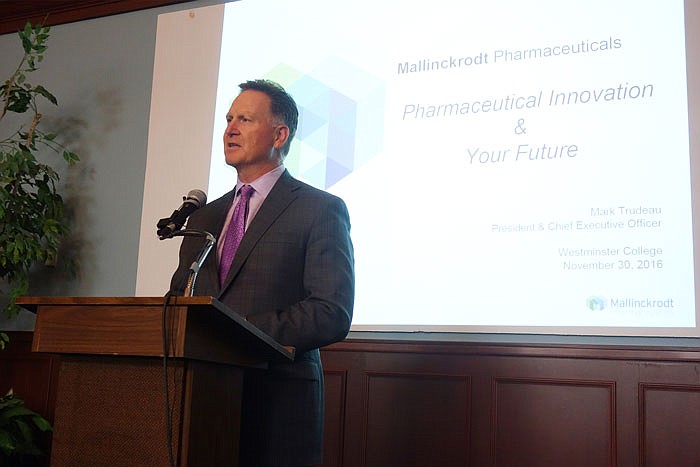Mark Trudeau, president and CEO of Mallinckrodt Pharmaceuticals, delivered a hopeful message about the future of health care at Westminster College in Fulton on Wednesday.
"Health in general across the world is improving," he said.
Trudeau has a long history in the industry. He formerly served as the CEO of Bayer, as well as in other high-profile roles in other companies. He and Westminster President Benjamin Ola. Akande, who introduced him, met through connections in St. Louis. Two years ago, the two competed against each other in a Dancing with the Stars-style fundraiser.
"He beat all of us and took the first-place position, but he's still my friend," Akande said.
At his lecture, Trudeau opened by explaining some of the progress made in developing medicines recently.
"We all talk about finding a cure for cancer," he said. "Surprisingly, many cancers are now curable."
Trudeau knows this firsthand. Last year, his daughter (then 18) was diagnosed with a rare form of leukemia.
"Had she been diagnosed with the same cancer five to 10 years previously, the death rate was 90 percent," he said.
Thanks to intense chemotherapy and a five-week stay at a tertiary care center, his daughter's cancer is in remission, and she is currently a freshman at the University of Cincinnati.
"What was formerly one of the most deadly cancers is now one of the most curable types of cancer," he said.
That is thanks to new drug therapies. There are currently 7,000 new types of pharmaceuticals in development in the world. Not all focus on prominent problems, such as cancer, HIV and heart disease. Some take aim at smaller targets.
There are thousands of rare diseases affecting fewer than 200,000 individuals a year, and only 5 percent currently have treatments.
Many disproportionately affect countries in the developing world. But recent efforts to develop new drugs have led to 500 being approved by the FDA since 1983.
"Often people ask 'Why are pharmaceuticals so costly?'" Trudeau said.
On average, he explained, a new medicine takes 10 to 15 years to develop, with a cost of $2.6 billion. And drugs aren't the only cost in health care.
"The cost of my daughter's hospitalization was 10 times that of her drugs, and those are what actually cured her," he said.
He said while high medicine prices are indeed a problem, the overall cost of health care in the U.S. should come down. He hopes the industry can eventually provide the best care at the lowest possible price. However, he doesn't see an easy way to get there.
"We need to recognize that it's a challenging issue," he said, "and we need to address all the big pieces, including pharma."
One of Malinckrodt's treatments in development, StrataGraft, will address a small piece of that. The current main treatment for severe burns involves taking skin grafts from elsewhere on the body.
"You cause a wound to cure a wound," he said.
Often, the process takes multiple surgeries and leaves major scars. StrataGraft involves growing sheets of human skin from an "immortal skin cell line," meaning it can continue replicating indefinitely. Surgeons will be able to simply cut off a piece and apply it over the burn, where the patient's own skin will fuse with it and eventually replace it.
"It's literally a miracle," Trudeau said enthusiastically.
Trudeau encouraged students intrigued by his talk to pursue careers in the pharmaceutical industry - both on the technical side and the administrative side.
"We need highly innovative people who are very passionate about turning their ideas into products," he said.
"We need you. We need you desperately."

